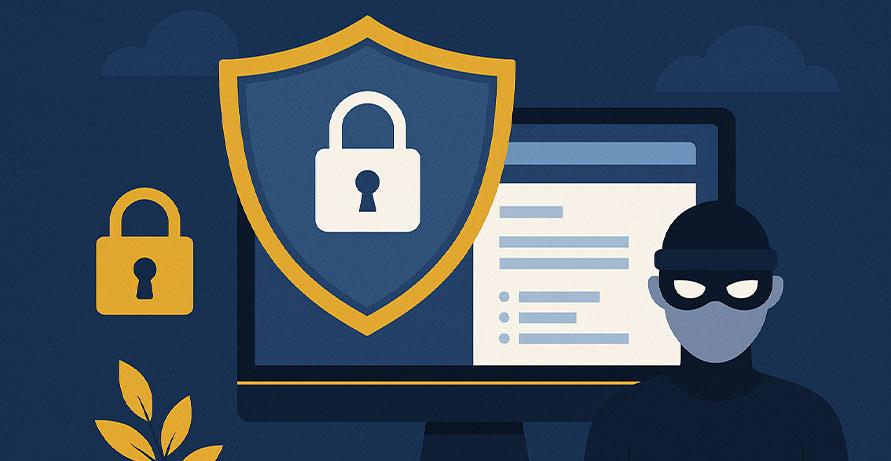How to Secure Your Website from Hackers?

In today’s digital world, your website is more than just an online presence. It is the face of your business, the hub of your brand, and often the first touchpoint for potential customers.
Unfortunately, it is also one of the most common targets for cyberattacks. Hackers exploit vulnerabilities in outdated software, weak passwords, or unsecured hosting to steal data, disrupt services, or inject malware that damages your reputation and search rankings.
Whether your website runs on WordPress, Drupal, Laravel, or another platform, taking website security seriously is essential.
At Anchor Points, we specialize in building and maintaining secure, high-performance websites. This guide explains practical steps to protect your website from hackers and keep your data safe.
1. Keep Your Website Updated
Outdated CMS versions, plugins, or themes are the most common entry points for attackers.
Each time you delay an update, you leave an open door for hackers who scan the internet for known vulnerabilities.
- Always keep your CMS (WordPress, Drupal, etc.) up to date.
- Regularly update plugins, themes, and server software.
- Remove unused extensions that may no longer be supported.
💡 Tip: If you are still using Drupal 7, it is time to upgrade. At Anchor Points, we help businesses migrate safely to Drupal 10 or WordPress while preserving data, design, and SEO performance.
2. Install an SSL Certificate and Use HTTPS
HTTPS is a basic requirement for every website. It encrypts communication between users and your server, protecting sensitive information such as passwords, payment details, and personal data.
- Install a valid SSL certificate on your domain.
- Redirect all traffic from
http://tohttps://. - Regularly renew your certificates to avoid warnings.
Free SSL certificates are available through Let’s Encrypt, or you can use a managed SSL service from your hosting provider.
3. Use Strong Authentication and Password Policies
Weak passwords are like leaving your front door unlocked. Use strong, unique passwords for all administrator and user accounts.
- Combine uppercase, lowercase, numbers, and symbols.
- Avoid predictable usernames such as “admin.”
- Enable two-factor authentication (2FA).
- Change passwords regularly.
🛠 Pro Tip: Password managers such as 1Password, Bitwarden, or LastPass can help you create and store secure credentials safely.
4. Limit Admin Access and User Roles
Not everyone on your team needs full access to your website’s backend. Assign the right level of access to minimize risk.
- Assign specific roles and permissions.
- Remove inactive or unknown users.
- Do not share one admin login among several people.
- Audit access logs regularly.
5. Use a Web Application Firewall (WAF)
A Web Application Firewall filters incoming traffic and blocks malicious requests before they reach your server.
A WAF helps protect against:
- SQL injection
- Cross-site scripting (XSS)
- Distributed Denial-of-Service (DDoS) attacks
Reliable providers include Cloudflare, Sucuri, and AWS WAF. Many hosting companies now offer WAF protection built in.
6. Backup Your Website Regularly
Even with great security, no website is completely immune to attacks. Backups ensure that your data can be recovered quickly after an incident.
- Automate daily backups of files and databases.
- Store backups offsite or in cloud storage.
- Test backups regularly to confirm they work.
Having a clean backup can prevent costly downtime or data loss.
7. Scan for Malware and Vulnerabilities
Regular malware scans help you find and fix issues before they spread.
- Use tools like Sucuri SiteCheck, Wordfence, or Acunetix.
- Schedule weekly or biweekly scans.
- Review reports and resolve flagged issues immediately.
At Anchor Points, we provide automated vulnerability scanning as part of our maintenance packages.
8. Choose a Secure Hosting Provider
Your hosting environment directly affects security. Avoid shared hosting plans that expose your site to other users’ vulnerabilities.
Choose a host that offers:
- Server-level firewalls and malware protection
- Daily backups
- Regular security patching
- 24/7 monitoring and technical support
Secure hosting is the foundation of a strong website.
9. Protect Forms and Login Pages
Bots often target contact forms and login pages to exploit weak inputs.
- Add CAPTCHA or Google reCAPTCHA to all forms.
- Limit failed login attempts.
- Sanitize user inputs to block harmful scripts.
- Avoid showing detailed error messages that reveal system details.
10. Monitor Activity and Logs
Constant monitoring helps detect unusual activity before damage occurs.
- Enable and review access logs.
- Track login activity and file modifications.
- Set up alerts for multiple failed login attempts or suspicious uploads.
Proactive monitoring allows faster incident response.
11. Hide Default CMS Paths
Hackers often target default admin URLs such as /wp-admin or /user/login. Changing these paths adds an extra layer of protection.
- Change default admin URLs.
- Disable directory listing.
- Restrict admin access to specific IP addresses.
12. Train Your Team
Security is not only a technical issue but also a human one. Train your staff to follow best practices and recognize potential threats.
- Teach employees to spot phishing attempts.
- Review safe browsing and file upload practices.
- Encourage reporting of suspicious activity immediately.
Bonus Tip: Schedule Regular Security Audits
Website security is an ongoing process. Conduct regular audits to ensure everything remains up to date.
- Review user access and roles.
- Check file permissions.
- Test backups.
- Scan for new vulnerabilities.
- Review third-party plugins and integrations.
Partnering with a trusted agency like Anchor Points ensures continuous protection through expert audits and monitoring.
Final Thoughts
Website security protects your business, your customers, and your reputation. Regular updates, strong passwords, secure hosting, and proactive monitoring can prevent most common attacks.
At Anchor Points, we help businesses build secure, scalable, and SEO-friendly websites. If you need a security audit, website upgrade, or complete rebuild, our team can create a plan that keeps your digital assets safe.
Ready to secure your website?
Schedule a free website security assessment with our experts today.
👉 Book a call








